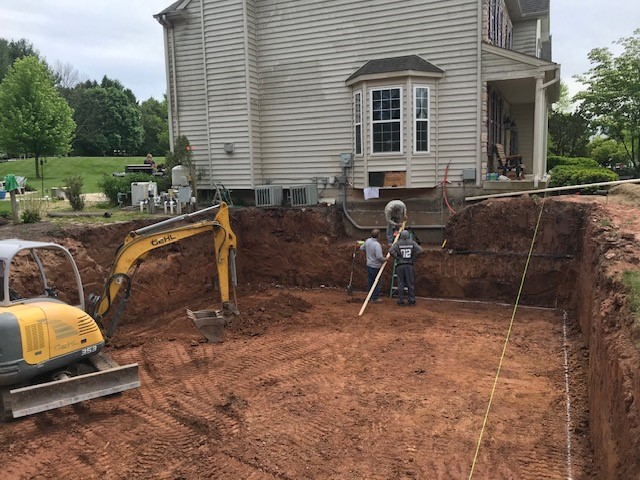Septic Ohio - Comprehensive Septic System Providers in Ohio
Septic Ohio - Comprehensive Septic System Providers in Ohio
Blog Article
Comprehensive Excavation Techniques: Mastering the Principles for Success
In the realm of construction and civil engineering, the value of efficient excavation approaches can not be overstated. The cautious preparation, specific execution, and careful focus to detail needed in excavation tasks require an extensive strategy that encompasses different fundamental facets. From preliminary dirt evaluation to the application of safety and security measures and normal development monitoring, grasping these core aspects is crucial for achieving success in any excavation venture. The real proficiency exists not just in recognizing these principles yet in flawlessly integrating them to navigate the complexities of excavation projects with finesse.
Recognizing Excavation Job Planning

Effective excavation jobs are improved the structure of meticulous and detailed preparation. The preliminary phase of any excavation project is the drawing board, where crucial choices are made that can considerably influence the result of the task. During this phase, it is vital to collect all pertinent information concerning the site, including topographical studies, soil structure, and any kind of potential dangers that might exist. Comprehending the task budget plan, timeline, and scope constraints is essential for developing a comprehensive excavation plan that makes sure the project's success.
One key facet of excavation job planning is the development of a thorough timeline that describes the series of tasks, deadlines, and landmarks. By thoroughly considering all these factors throughout the preparation phase, excavation tasks can be executed efficiently and properly, leading to effective end results - lancaster excavation.
Soil Evaluation and Website Examination
Performing extensive dirt evaluation and site assessment is a critical action in the prep work stage of any excavation job. Soil analysis includes establishing the composition, structure, and buildings of the dirt at the excavation website. This information is important for comprehending the dirt's bearing ability, dampness web content, and potential for erosion, which are key consider determining the excavation methods and equipment required for the task.
Website analysis exceeds dirt evaluation and incorporates a more comprehensive analysis of the total website problems. This examination consists of determining any type of prospective hazards, such as underground energies, ecological problems, or unpredictable surface, that can influence the excavation procedure. By thoroughly examining the site, project managers can develop efficient excavation methods that focus on security, efficiency, and ecological defense.
Using advanced innovations like ground-penetrating radar, dirt tasting, and drone surveys can enhance the precision and effectiveness of soil analysis and website examination. Investing time and resources in these preliminary steps can inevitably conserve time and avoid costly hold-ups or issues during the excavation procedure.
Tools Choice and Utilization
Reliable excavation jobs rely greatly on tactical equipment option and use to ensure optimum performance and performance. Choosing the appropriate devices for the job is crucial in optimizing effectiveness and reducing downtime. Aspects such as the sort of dirt, depth of excavation, and job scope play a considerable role in establishing the most ideal equipment for the job handy.

Along with picking the suitable devices, appropriate use is key to official website job success. Operators should be trained to deal with the devices safely and efficiently - septic ohio. Regular maintenance checks and timely repairs assist avoid break downs and guarantee consistent efficiency throughout the task
Safety Measures and Rules Conformity
In the realm of excavation jobs, prioritizing precaution and conformity with laws is extremely important to ensuring a secure and legitimately sound operational environment. Precaution include a range of techniques, including conducting thorough site assessments, executing proper signage and barriers, and supplying appropriate safety and security training for all personnel associated with the excavation procedure. Adherence to guidelines, such as OSHA requirements in the USA, makes sure that the excavation job fulfills the essential requirements to shield workers, onlookers, and the surrounding atmosphere.

Surveillance Progress and Adjusting Methods
Exactly how can forecast supervisors effectively track the development of excavation projects and adapt their approaches appropriately to optimize outcomes? Tracking progress is crucial for ensuring that excavation jobs remain on track and satisfy due dates. Task supervisors can use various tools and methods to track progress, such as daily report card, routine site evaluations, and progressed tracking technologies like drones and general practitioners tracking Homepage systems. By continuously monitoring the job's advancement, supervisors can identify any kind of possible hold-ups or problems at an early stage and take proactive procedures to address them.

Final Thought
In conclusion, understanding the basics of comprehensive excavation strategies is important for the success of any kind of project. By recognizing job preparation, evaluating soil and website conditions, choosing ideal tools, adhering to safety regulations, and checking progress, project managers can make certain a websites effective and smooth excavation procedure. Executing these approaches will bring about effective outcomes and lessen potential dangers or troubles during the excavation project.
The preliminary stage of any type of excavation project is the preparation phase, where important choices are made that can dramatically affect the result of the project. Recognizing the project range, budget plan, and timeline constraints is important for developing a thorough excavation plan that guarantees the task's success.
How can project managers successfully track the advancement of excavation projects and adjust their approaches accordingly to enhance outcomes? By carefully checking progression and being eager to adjust approaches, project supervisors can improve the total success of excavation tasks.
By recognizing task planning, examining soil and website problems, selecting proper devices, conforming with security guidelines, and monitoring progression, project managers can ensure a smooth and reliable excavation process.
Report this page